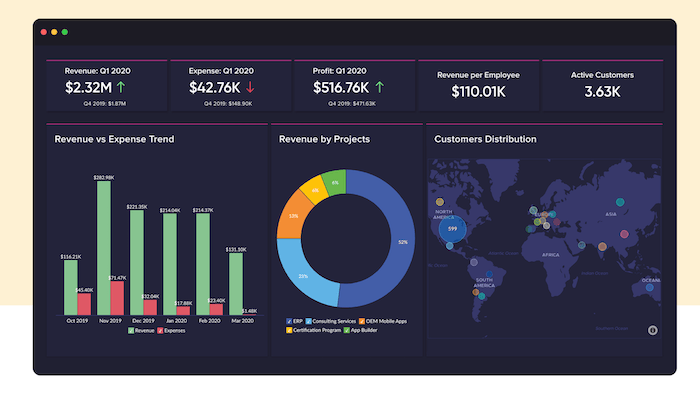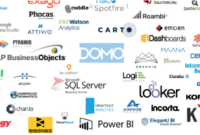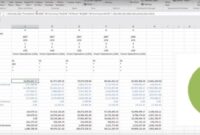In the realm of data analytics, business intelligence reporting software emerges as a beacon of clarity, empowering businesses to harness the power of their data and make informed decisions. Dive into this comprehensive guide to unravel the secrets of this transformative tool and unlock the gateway to data-driven success.
Market Overview
The global business intelligence (BI) reporting software market is experiencing significant growth, driven by the increasing need for data-driven decision-making and the proliferation of data sources. The market size is projected to reach $30.6 billion by 2026, growing at a CAGR of 12.1% from 2021 to 2026.
Key trends shaping the market include the rise of cloud-based BI solutions, the adoption of artificial intelligence (AI) and machine learning (ML) for data analysis, and the increasing focus on data visualization.
To get the most out of your business intelligence data, you need the right reporting software. With the right software, you can easily create reports that are visually appealing, easy to understand, and actionable. For more information on business intelligence, check out blog.dosenpintar.com business intelligence.
With the right business intelligence reporting software, you can make better decisions that will help your business grow.
Major players in the industry include Microsoft, IBM, SAP, Oracle, and Tableau. These companies offer a wide range of BI reporting software solutions, from on-premise to cloud-based and open-source options.
Key Features and Functionality, Business intelligence reporting software

Business intelligence reporting software provides a range of features and functionality that enable businesses to gather, analyze, and visualize data. These features include:
- Data integration and preparation
- Data modeling and analysis
- Report design and creation
- Data visualization and dashboards
- Collaboration and sharing
These features allow businesses to:
- Gain a holistic view of their data from multiple sources
- Identify trends and patterns in their data
- Create reports and dashboards that communicate insights effectively
- Collaborate on data analysis and reporting projects
Benefits of Using Business Intelligence Reporting Software
There are numerous benefits to using business intelligence reporting software, including:
- Improved decision-making
- Increased efficiency
- Enhanced customer insights
- Reduced costs
- Improved compliance
For example, a manufacturing company that implemented BI reporting software was able to identify areas where they could reduce waste and improve efficiency. This resulted in a 15% reduction in production costs.
To harness the full potential of your business intelligence reporting software, it’s essential to explore real-world applications. Dive into our comprehensive business intelligence case study to witness how organizations have leveraged this technology to drive data-driven decisions, improve operational efficiency, and achieve remarkable business outcomes.
With insights from successful implementations, you’ll gain invaluable knowledge to optimize your own business intelligence reporting software for maximum impact.
Another example is a retail company that used BI reporting software to gain insights into customer behavior. This allowed them to personalize their marketing campaigns and increase sales by 10%.
Types of Business Intelligence Reporting Software

There are three main types of business intelligence reporting software:
- On-premise
- Cloud-based
- Open-source
On-premise BI software is installed on a company’s own servers. This gives businesses complete control over their data and security. However, on-premise BI software can be expensive to implement and maintain.
With the right business intelligence reporting software, you can empower your team to make better decisions and achieve better outcomes. This software provides you with the insights you need to understand your business, identify trends,
and forecast future performance. It can also help you automate reporting tasks, freeing up your time to focus on more strategic initiatives.
If you’re looking to take your business intelligence to the next level, consider investing in a business intelligence reporting software. It could be the key to unlocking the full potential of your data and driving your business forward. And if you’re interested in a career in business intelligence, you may want to consider becoming a business intelligence analyst.
These professionals are in high demand, and they can earn a comfortable salary. With the right skills and experience, you could be well on your way to a successful career in business intelligence.
Cloud-based BI software is hosted by a third-party vendor. This makes it easy to implement and use, but businesses do not have as much control over their data and security.
Open-source BI software is free to use and modify. This makes it a cost-effective option for businesses, but open-source BI software can be more difficult to implement and maintain.
Final Summary: Business Intelligence Reporting Software
Business intelligence reporting software is not merely a tool; it’s a catalyst for transformative growth. By harnessing the power of data, businesses can gain unprecedented insights, optimize operations, and stay ahead in an ever-evolving competitive landscape. Embrace the future of data-driven decision-making and unlock the full potential of your organization with business intelligence reporting software.
Q&A
What is business intelligence reporting software?
Business intelligence reporting software is a powerful tool that enables businesses to collect, analyze, and visualize data from various sources, providing valuable insights and supporting informed decision-making.
How can business intelligence reporting software benefit my business?
By leveraging business intelligence reporting software, businesses can improve decision-making, increase efficiency, enhance customer insights, and quantify the return on investment (ROI) for data-driven initiatives.
What are the different types of business intelligence reporting software available?
Business intelligence reporting software comes in various types, including on-premise, cloud-based, and open-source solutions, each with its advantages and disadvantages. Choosing the right type depends on specific business needs and requirements.
How can I ensure a successful implementation of business intelligence reporting software?
Successful implementation involves careful planning, data preparation, data modeling, and report design. Following best practices and seeking expert guidance can maximize the value of the software and drive tangible results.




